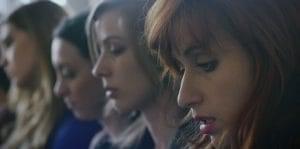
Film noir, a French phrase meaning ‘dark film’ refers to a whole genre of motion pictures about the seedy underworld, usually either a dramatic or an action-oriented perspective, with an emphasis on the cynical, burn-the-world attitudes of its good-for-nothing protagonists. The 1940s well into the 1950s was the heyday for this kind of film, making stars out of such luminaries as Humphrey Bogart and Richard Widmark. Heavily influenced by the interplay of shadow and light in the early German expressionist films a la the head trip The Cabinet Of Dr. Calagari or the horror of The Golem, these crime films seek to use the same impressionist landscapes to heighten the reality and highlight the emotional state of their characters. Nowadays, noir doesn’t just refer to the darker, grim stuff. There are sci-fi noirs, the most notable title being Blade Runner, The Crow is a comic book based film that uses the imagery associated with the genre to its advantage, and of course, there is comedic noir takes. Some are straight out spoofs such as Lonely Street, few revel in the comedic banter of the partners in crime like with the brilliant screenplay for Lucky Number Slevin. Drive is perhaps the most well known, and arguably, the best of the neo-noir trend, which is a revisionist modern take on these well-worn tropes.
Los Angeles Overnight, a new neo-noir movie, sees Priscilla (Arielle Brachfeld) struggling to make ends meet. Her acting auditions go nowhere and her dead-end waitress job at Marilyn’s (where all the employees are costumed to resemble Marilyn Monroe) is cutting her hours. She overhears regular customers Cousins (Lin Shaye) and her two cronies—petty thieves who fancy themselves grander—discuss where they stashed a huge haul. She, and her new boyfriend Benny (Azim Rizik) steal it from the thieves. All the while, the crime boss Wooks (Julian Bane) and his henchman Karl (Carey Fox), doing Wooks’ dirty work, set out to discover the identity of those who robbed him.

“She overhears regular customers…discuss where they stashed a huge haul…”
Beginning inception as a Kickstarter project in 2015, Los Angeles Overnight, originally called Day For Night, is finally hitting video-on-demand. Australian director Michael Chrisoulakis clearly made his feature-length debut with a lot of love and a stylish eye. Priscilla and Benny walk from their car through a series of alleys to The Neon, a bar in which the money is hidden is one long, gorgeous shot. The editing by Melanie Annan and Chrisoulakis is jaw-dropping in its intensity and pacing, recalling, in the best way the French New Wave of the 1960s. The French New Wave also heavily featured neo-noirs films so if that style of filmmaking turned out to be a huge influence on this title, it wouldn’t be a surprise at all. There is also a wonderful montage that showcases the struggles of actresses trying to get a role, any role, and how daunting the process can be.
Aside from excellent visuals and editing, the movie is impressively cast. It is always a pleasure to see Lin Shaye in just about anything and getting to see her play against type is a lot of fun. In the beginning, Brachfield is hard to get ahold of, as her first few scenes she sounds so disaffected and unengaged, but as the story progresses and the character becomes more confident. Brachfield explodes with energy before the audiences’ eyes. Rizik is playing the only out-and-out likable person in the entire film and is rather charming and fun, having the only funny line in the movie, “I dance like a mechanic.” Carey Fox makes for a particularly enjoyable heavy, playing the crazy, violent man with wild-eyed glee.

“Neo-noirs that try to balance a modern setting with traditional trappings of the genre are tricky beasts…”
Guy J. Jackson’s script, his first full length one, is not nearly as clever as it thinks it is. The movie never comes together as a whole. Several individual sequences work stupendously, the aforementioned finding of the money, or a brilliantly intense moment where Karl is torturing someone to discover where the money is, are standout moments that make the experience of watching Los Angeles Overnight slightly interesting. However, there is no clear motivation for most of these characters and the movie shifts tonally on a dime, which doesn’t work. Priscilla wants money and to be an actress, and that is all the viewer ever finds out. Wooks seems to have come from a different, more comedic draft of the screenplay, as he abhors violence and wants to build a large sanctuary for reasons? Given how often it is mentioned, only knowing it exists seems odd
While Shaye is fun, her character’s use of archaic slang—a direct callback to the vernacular used in all those early noir films—is forced and clumsily executed. Applejacks equal large rolls of bills, and according to several different slang and modern online dictionaries, is not an active or real substitution for money. It is random dialogue and word choices like this that make Los Angeles Overnight impossible to fully engage with on a story level. Nothing about how the characters act or speak come from any reality, not even the one presented here, as each person speaks entirely different. Cousins and her friends come wholesale from a slightly comedic 1940s movie, Priscilla is altogether modern in her dress and speak, and so on. If the characters can’t connect to themselves, there is no hope that the audience will be able to do so either.
Neo-noirs that try to balance a modern setting with traditional trappings of the genre are tricky beasts. Los Angeles Overnight gets a lot right with excellent cinematography and engaging editing, all expertly acted, but it lacks clarity, tries too hard with its dialogue, and the characterizations are murky at best.

Los Angeles Overnight (2018) Directed by Michael Chrisoulakis. Written by Guy J. Jackson. Starring Lin Shaye, Arielle Brachfield, Azim Rizik, Carey Fox, Julian Bane, Sally Kirkland.
Grade: C
